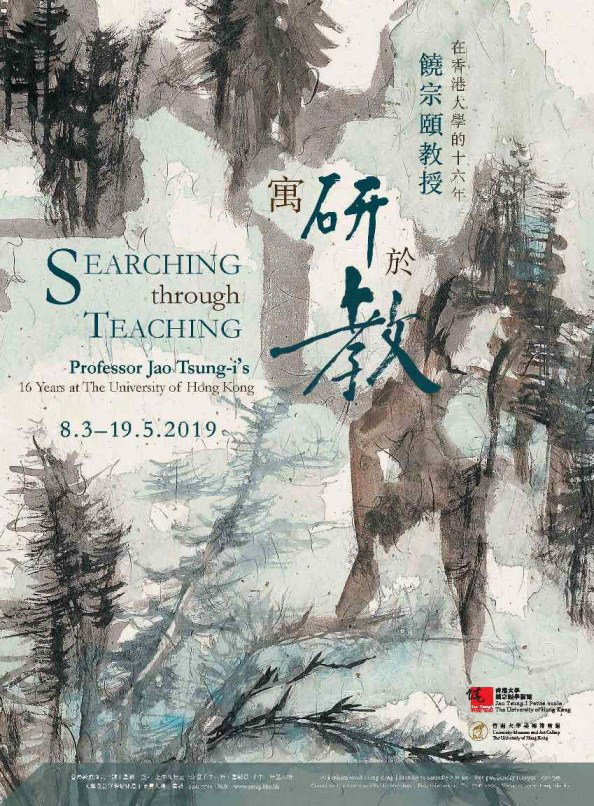藝術
寓 研 於 教 — 饒宗頤教授在香港大學的十六年
SEARCHING through TEACHING
- Professor Jao Tsung-I's 16 Years at The University of Hong Kong
| 日期: | 8/3 - 19/5/2019 |
| 時間: | 星期一至六:上午九時三十分至下午六時 | 星期日:下午一時至六時 Monday - Friday: 9:30am - 6:00pm | Sunday: 1:00 - 6:00pm |
| 地點: | 香港大學美術博物館 (香港般咸道九十號) The University Museum and Art Gallery of The University of Hong Kong (90 Bonham Road, Hong Kong) |
| 查詢: | 2241 5500 |

「寓研於教——饒宗頤教授在香港大學的十六年」展覽將由香港大學美術博物館與香港大學饒宗頤學術館於二零一九年三月八日至五月十九日聯合主辦,展出饒教授在一九五二年至一九六八年於香港大學任教時的有關資料,顯示出他如何在這段時間,通過教學、研究及與國際間之交流,遂成為一位蜚聲國際的學者。
是次展覽將分為教學、研究、交遊及饒教授捐贈港大的書籍及藝術作品等四個主要區域,展品包括其著述、授課筆記、考卷、信件、書畫作品及部份其原藏之古籍與簽名本等。
本次展品由饒宗頤教授家屬、香港大學美術博物館及香港大學饒宗頤學術館等借出。透過各類展品,可見饒教授在港大的十六年間,是如何通過教研及國際學術交流活動,由香港走向世界,對當時乃至往後的國際漢學界產生鉅大影響。 饒教授一直十分感恩香港大學對他的造就,尤其對港大中文系的林仰山教授(Professor F. S. Drake)、羅香林教授和賀光中先生等人的知遇和提攜。港大是一所很典型的教授治校、學術為主、重視自由的研究型大學,正因這種優良的制度,才使饒教授於港大任教的十六年間可專注於多個不同領域的學問。港大亦是一所國際性大學,提供了優越的文化交流的平台,使饒教授除了與港臺眾多學友交流外,還可更順利地走向西方漢學界,與一些享譽世界的漢學大家如戴密微(Paul Demiéville)、霍克思(David Hawkes)、李約瑟(Joseph Needham)、吉川幸次郎等頻密接觸,互相交流研究心得,並得以參加一些重要國際學術會議。這一切最終也成就了饒教授為一代大家。
In collaboration with the Jao Tsung-I Petite Ecole of The University of Hong Kong, the University Museum and Art Gallery will present Searching through Teaching: Professor Jao Tsung-i’s 16 Years at The University of Hong Kong from March 8 to May 19, 2019. The works on exhibit, which date from Professor Jao’s 1952–1968 tenure at HKU, illustrate how this period of teaching, research and international exchange laid the foundations for his development as an internationally acclaimed scholar.
The exhibition is divided into four main areas: teaching, research, social circle, and books and artworks donated to the University by Professor Jao. Exhibits include his authored books, lecture notes, examination papers, letters, paintings, calligraphy, and part of his original collection of rare books and autographed editions.
The exhibits are on loan from the Jao family, UMAG, and the Petite Ecole. The broad assortment of items elucidates how Professor Jao’s 16 years of teaching, research, and engagement with international academic exchange at HKU led him from Hong Kong to the world stage, thus bringing a tremendous and lasting impact on the international community of sinologists.
Professor Jao expressed enduring gratitude for the University’s contributions to his achievements. He was particularly grateful to Professor F. S. Drake, Professor Lo Hsiang-lin, and Mr. Ho Kwong-chung of the Chinese Department for their encouragement and support. HKU’s structure as a research institute is a key reason that Professor Jao could focus on multiple fields of study during his 16 years on campus. As an international university, HKU also offered him an outstanding platform for cultural exchange. This platform, in addition to allowing Professor Jao to engage with local and Taiwanese colleagues, facilitated his entry into western sinology circles and his close contact with several world-renowned sinologists. This group of scholars, with whom he frequently exchanged research and insight, included Paul Demiéville, David Hawkes, Joseph Needham and Kōjirō Yoshikawa. His association with the University also allowed him to participate in a number of key international academic conferences. Ultimately, each of these factors contributed to Professor Jao becoming one of the leading authorities of his generation.
